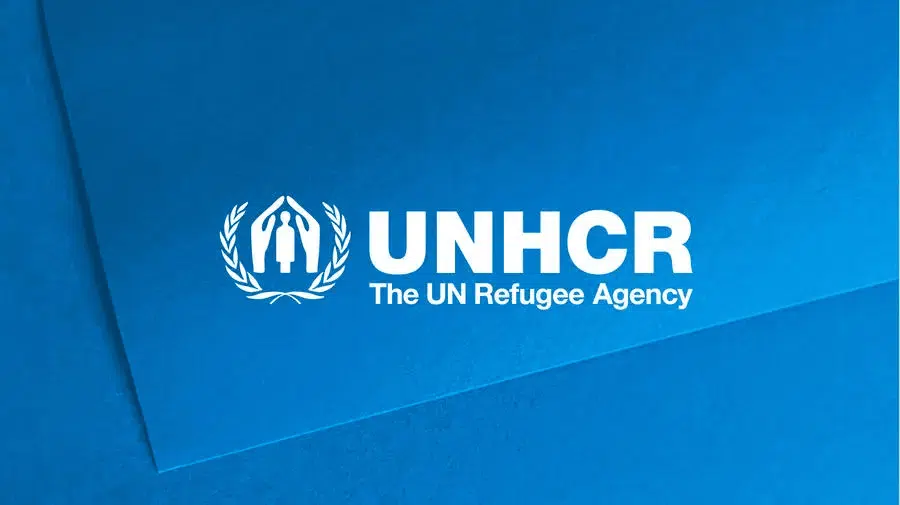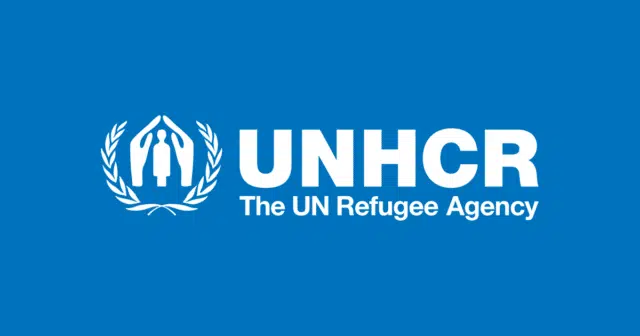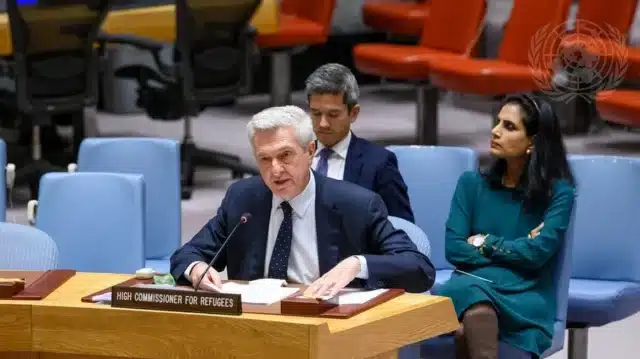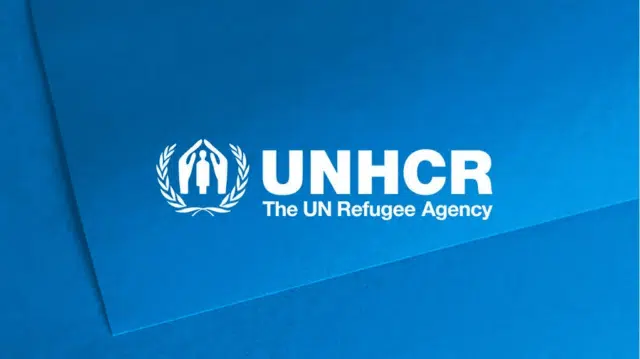
© UNHCR
There was a time, in the lives of many of us, in which we thought that we had entered an era of peace — not perfect peace, not global peace, but peace that could progressively extend to further parts of the world. A time, after the Berlin Wall was finally reduced to rubble, when cooperation would — gradually but surely — substitute the fractures of the Cold War.
This is why — when Pope Francis, a few years ago, warned that we were close to a “Third World War in pieces,” I dismissed the thought as exaggerated.
But Pope Francis might have spoken with sad foresight — as he often does — when he coined that expression. Because, dear friends, as we look in anguish at the destruction of Gaza — after having watched Ukrainian neighbourhoods devastated by Russian rockets; peaceful Sudanese cities savaged by armed men; communities in Ethiopia torn apart by violence; Afghanistan drifting from years of civil strife into an apparent tranquillity in which women’s rights are denied — when we look at this litany of crises, one after the other, we can only conclude the same.
We live — again — in a time of war.
Thank you, Ahmad [Fawzi], for your introduction, and to the Kofi Annan Foundation for inviting me here to speak. Many thanks to Marie-Laure [Salles] and the Graduate Institute for hosting us, it’s always a pleasure to cross the street. Many thanks to Nathalie Fontanet for conveying Geneva’s commitment to peace, and to Patricia [Danzi] and Jürg [Lauber] and the Swiss Government for your steadfast support of UNHCR and humanitarian work.
Thank you, dear Barbara [Hendricks], for your and Ulf [Englund]’s moving performance – you really made me cry – and also for your incredible solidarity for refugees and UNHCR, as we heard spanning decades.
It is an honour to be here in the name and in the spirit of Kofi Annan: our Secretary-General during the formative years of so many of us in the United Nations and beyond, and someone who generously remained available to a multitude of friends and colleagues afterwards, as a trusted and valued mentor and adviser. It is hard to believe that it has been five years since he left us.
And it is truly topical to speak in the spirit of such a man of peace — at a time of war.
A time in which — with increasing impunity — men pick up arms to kill, rape, destroy and above all seize power. A time of great global divisions — perhaps the most severe that we have seen in our living memory. No matter where we look and which issue is discussed, we see, we feel those divides, from global geopolitics to local communities. We are almost driven to polarization, as if it had become impossible to consider different perspectives: ‘be with us, otherwise you are not good; not loyal; and not deserving of respect and rights’.
The big rifts: north/south; east/west, rich/poor, strong/weak, have been made even more visible by the unequal and inequitable response to the COVID-19 pandemic; by the responses to the Russian invasion of Ukraine; and now — putting us at risk of a fracture that could be irreparable — by the war in Gaza.
My organisation, UNHCR — as you know — does not have a mandate to operate in the Occupied Palestinian Territory. But as a humanitarian, and having served with UNRWA for nine years, and as somebody very concerned about the potential spread of the conflict, I am compelled to speak about this terrible situation. I share wholeheartedly the views of Secretary-General António Guterres, as he expressed them most clearly at the Security Council on 24 October.
Hamas’ attacks against Israeli civilians must be condemned and hostages released; and the Israeli military operation that is killing Palestinian civilians, destroying civilian infrastructure and denying access to basic assistance is simply wrong. This escalation by the way is also counterproductive, and it will take us even further from the real and just peace which alone can guarantee safety and security to Israelis and Palestinians.
So, although the images of this terrible war fill us with anguish and pain, we must do everything in our power to try and turn this devastating crisis into an opportunity to renew the discourse of peace in the Middle East. Because, as I told the Security Council on Tuesday, let us not fool ourselves: a solution to the Israeli-Palestinian conflict has not been “elusive” in the past few years — it has been consciously, wilfully, repeatedly neglected, as something almost irrelevant, that other, broader initiatives would make unnecessary. It was increasingly felt that efforts to bring real peace — no doubt difficult, even excruciating — could be substituted by temporary ceasefires responding to chronic flare-ups of violence. That life would return every time to normal — although there is nothing ‘normal’ in either occupying or being occupied, especially for 56 years — until the next eruption of violence, in an endless cycle.
That was a colossal miscalculation, as we painfully observe now.
And let me go beyond Gaza and the Middle East, because procrastinating peace and perpetuating unresolved conflicts — which do not disturb the powerful but have a disastrous impact on millions — is becoming the prevailing pattern in many places around the world.
This is why UNHCR, in its latest statistics (published just last week), reported 114 million refugees and displaced people, up from 110 million in the previous report, up from 89 million… and so forth. There were fewer than 40 million when Kofi Annan was Secretary-General. And this awful number is destined to grow, because new crises add themselves to the existing ones — UNHCR declared 46 emergencies in 32 countries in the past 12 months — and the existing ones suffer from the syndrome of procrastinated peace, and continuing conflict.
I won’t bore you with a long description of the many crises which we — the humanitarians — are grappling with every day. You can find this list in any of our reports, but just a few examples: Sudanese refugees in Chad tell us stories of rape, mutilation and murder in Darfur that 20 years ago caused outrage in the world, and today are barely a ripple in the 24 hour news cycle; the abuse of women and children in the east of the Democratic Republic of the Congo happens every day in a situation so desperate that survival sex has become a coping strategy for thousands displaced by this mother of all unresolved conflicts; displacement is growing in Sahel as a result of armed groups growing stronger amidst political instability, or in Myanmar where previous, fragile attempts at internal peace have collapsed after the military coup; the despair and destitution caused by the combined effects of conflict, climate and poverty have become global, and are pushing a growing number of people on risky routes as we heard from Barbara’s poem — among those moving across one of the most dangerous places on earth, the Darien Gap in Central America, where I will be next week, are men and women from African and Asian countries.
Dear friends,
In this world of wars, it has become easier to speak of retribution and score settling (like the members of the Security Council far too often do) instead of the peace and security they are supposed to pursue and maintain. This is why this Geneva Peace Week is so necessary and timely, and this is why the work of the Kofi Annan Foundation remains so critical.
Kofi Annan of course, as many of you know better than me, was the embodiment of this notion — that peace must be pursued, as we heard, even when it appears impossible to do so. In this, he was the ultimate United Nations official. And let me tell you how proud I felt watching that video. He was a fierce multilateralist. A proud African and an international leader. And a committed peacemaker.
Many of us have learned the lessons which leaders like him — and other international role models of his generation — have left to us through their lifework and crucial legacy in these difficult times. I benefited myself from their guidance and example.
So, today, let us be inspired by them. Kofi Annan would be, like so many of us are, dismayed by the state of the world. But he most certainly would not wallow in despair. He knew that we always had to contribute, in our own way, dealing with very difficult situations with eyes wide open; never naïve to the realities of the moment or dismissive of the history or the context.
Recognizing that progress is not simple, and it takes patience, commitment, and hard work.
Because, as he said, ‘peace is never a perfect achievement’.
And because, as he concluded in the preface of his autobiography, ‘I wish for a world in which men and women … [can] stand up to the forces of injustice and inequality wherever they exist – in other words, to intervene.’
So, today, as food for thought, let me offer some simple – simple – thoughts from my own perspective — which is not that of a political actor, but of a humanitarian — on the pursuit of peace and how we can all intervene.
First, let’s make sure, please, that we keep humanitarian action strong. This is an issue that worries me a lot these days. There are so many crises — and peace-making is failing so badly — that humanitarian presence and operations are more necessary today than ever. Humanitarians are out there and are saving lives. But we are being asked to do more with fewer resources. Political support and, crucially, much more funding are necessary to help and stabilise people. To give them at least some hope. If not, there will be even more suffering, death, displacement and anger; hardly the environment in which peace can take root.
Second, as I said, we humanitarians are there with the people. But we are often alone, especially in the very fragile situations in which we increasingly operate — for example under the control of de facto authorities, unrecognized regimes or governments under international sanctions. These are situations in which diplomats, development officials and business people leave — but humanitarians must stay, to save lives, if nothing else. This is where we should enjoy a great deal of flexibility, instead of being compelled to work with one hand behind our back, as is the case in many such places. Flexibility, first and foremost, from those controlling the territory, but also flexibility and trust on the part of others, including donors, giving us more space on how and with whom we engage to carry out our work.
Third, we must finally address — more decisively and systematically — one area which is crucial to pursue peace, which is to invest more efforts and resources in creating resilience among affected populations at the onset of a crisis. You may have heard some of us refer to ‘emergency development’, but we could equally speak of the need for ‘emergency peacebuilding’.
I recently visited Eastern Chad, the poorest part of a poor country which has been receiving — again — hundreds of thousands of Sudanese refugees from Darfur. We visited host communities sharing their meagre resources with those fleeing. Clearly, humanitarian assistance is neither sufficient nor adapted to ensure sustainable support to those in need. This is why I was grateful to be there with the World Bank, which, amidst this acute crisis, was able to pledge substantial resources to bolster the resilience of everybody: to build schools, reinforce health structures, create access to sustainable energy, address chronic food insecurity.
I call this peacebuilding, because the absence of these investments would mean an environment of such fragility that the risk of conflict spreading from nearby Sudan would be even higher. Resilience is a bulwark of peace. And it can only occur if there is a shift in the way development works — this is why the reforms of the global financial architecture promoted among others by the Secretary-General are so important. This is why reversing the climate emergency; or at minimum ensuring that the vulnerable have the tools and resources needed to mitigate or adapt to the circumstances – are also crucial peacebuilding measures, since climate change is a driver of conflict.
Dear friends,
There is a fourth and last point that I must raise. Our world — this world at war — desperately needs a reboot of the very principles of law and humanity to counter the trends and actions that we are seeing today. And here, I would propose that we look at this in two distinct, but related layers.
The first is a ‘hardware’ issue — the respect for the law. This is especially important as we get ready to celebrate the 75th anniversary of the Universal Declaration of Human Rights. Around the world we see basic human rights being violated with impunity, and even the rolling back of gains achieved over the years through hard work, and the sacrifice of many. Countering such trends, including pursuing justice as an instrument of peace, is fundamental and will help reset the social contract that is fraying at the edges within so many societies.
And talking of war, it is especially international humanitarian law that is increasingly being violated without any consequence for the violators, but with the gravest of consequences for civilians. As militaries become more powerful and technology makes it easier to fight (including from behind keyboards on the other side of the world), we see militaries and militants attacking civilians and civilian infrastructure with increasing boldness. This is unacceptable. While technology has changed, the conduct of hostilities and the respect for international humanitarian law must not. If it is more difficult to defeat your enemy on the battlefield, that is all the more reason to engage in negotiation instead of punishing civilians. Otherwise civilian attacks will only be met by more civilian attacks – as is said: an eye for an eye that will leave us all blind.
This is a call to political leaders, policy makers, and men with guns. But there is also a second layer; a ‘software’ dimension that each of us – irrespective of position or power – must reflect on. And here, for sure, I hear Kofi Annan’s voice.
It is a voice of respect for others, even or especially those with whom we do not agree. It is a voice of care. Of compassion. Of positive contributions in language and in deeds. In a world where we see so much division, even within societies; within families; a world with so much hate speech, including in its abhorrent forms of anti-Semitism or Islamophobia or against refugees and migrants; in a planet that is being so relentlessly attacked by man – in this troubled world, respect, care, compassion, and solidarity with humankind, are so necessary.
For it is upon those foundations — those values and the ways with which we, as individuals, carry ourselves — that peace, real peace, even an imperfect peace, can be built.
Thank you.





